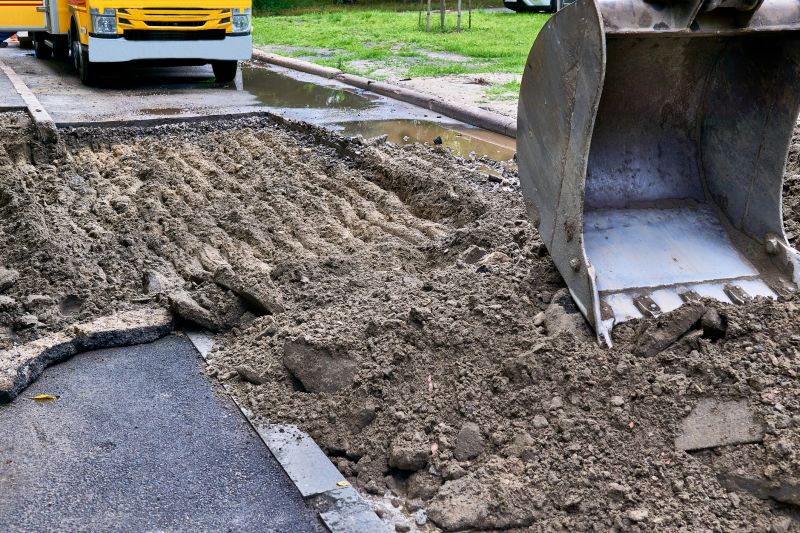Leading Equipment Choices for Excavation Service Professionals
Explore essential tools and machinery that enhance efficiency, safety, and productivity for excavation service providers.
 Excavation services require a diverse range of tools and equipment tailored to different project scales and specific site conditions. From small-scale residential work to large commercial projects, selecting the appropriate products can greatly influence efficiency and safety. Heavy-duty machinery such as excavators and backhoes are fundamental for digging, trenching, and material handling, offering versatility across various tasks. Hand tools like shovels, picks, and rakes remain essential for detailed work, site preparation, and finishing touches. Proper equipment selection ensures that excavation tasks are completed effectively while maintaining safety standards.
Excavation services require a diverse range of tools and equipment tailored to different project scales and specific site conditions. From small-scale residential work to large commercial projects, selecting the appropriate products can greatly influence efficiency and safety. Heavy-duty machinery such as excavators and backhoes are fundamental for digging, trenching, and material handling, offering versatility across various tasks. Hand tools like shovels, picks, and rakes remain essential for detailed work, site preparation, and finishing touches. Proper equipment selection ensures that excavation tasks are completed effectively while maintaining safety standards.
Top Overall Option
Heavy-Duty Excavation Machinery
A versatile and robust piece of equipment designed to handle a wide range of excavation tasks. It offers multiple attachments, high operational capacity, and advanced safety features, making it suitable for various project sizes. Its adaptability and durability make it a reliable choice for excavation professionals seeking efficiency and performance.
Types of Products For Excavation Service
Mini Excavators
Compact machines ideal for small to medium projects, providing maneuverability in tight spaces.
Backhoe Loaders
Versatile equipment combining digging and loading capabilities, suitable for various excavation tasks.
Skid Steer Loaders
Compact and powerful loaders used for digging, grading, and material transport.
Excavator Attachments
A range of tools including buckets, breakers, and augers that enhance excavation versatility.
Shovels and Spades
Hand tools essential for detailed digging and site finishing work.
Pickaxes
Tools used for breaking hard ground and rocks during excavation.
Wheelbarrows
Portable containers for transporting soil, gravel, and debris around the site.
Laser Levels
Precision tools for grading and ensuring accurate elevation during excavation.
Measuring Tapes
Essential for precise measurements and layout planning on site.
Safety Helmets
Protective headgear to safeguard workers from falling objects and impacts.
High-Visibility Vests
Clothing that enhances worker visibility in busy or low-light conditions.
Work Gloves
Protect hands from cuts, abrasions, and exposure to harsh materials.
Lifting Straps
Accessories used to safely lift and move heavy materials or equipment.
Dollies and Carts
Tools for transporting heavy or bulky items efficiently around the site.
Trenching Machines
Specialized equipment for digging trenches quickly and accurately.
Popular Choices
Widely used for small-scale excavation projects due to their maneuverability.
Popular for their versatility and ability to operate in confined spaces.
Commonly chosen for their multi-functionality in construction and landscaping.
Essential attachments for efficient digging and material handling.
A staple safety item for workers in excavation sites.
Frequently used to ensure worker visibility on active sites.
Popular for drilling holes for posts, foundations, and utilities.
Commonly employed for transporting materials across the site.
Favored for achieving precise grading and alignment.
Regularly selected for hand protection during excavation tasks.
Popular for trenching in utility and drainage projects.
Indispensable for accurate measurements in site layout.
In addition to machinery and hand tools, safety equipment plays a crucial role in any excavation operation. Items like protective helmets, gloves, and high-visibility clothing help safeguard workers against potential hazards. Material handling accessories such as lifting straps, dollies, and wheelbarrows facilitate the movement of heavy or bulky materials, improving workflow. For precision and efficiency, laser levels and measuring tapes are commonly used to ensure accurate grading and alignment. Investing in high-quality, durable products suited to the scope of the project can help mitigate delays and reduce operational costs.
Maintenance and proper storage of excavation equipment are vital for longevity and performance. Regular inspections, cleaning, and timely repairs can prevent breakdowns and extend the lifespan of machinery. When selecting products, consider compatibility with existing equipment, ease of use, and availability of replacement parts. Whether working on a small backyard project or a large construction site, having the right assortment of tools and machinery tailored to the task can streamline operations and promote safety. Overall, a well-equipped excavation service relies on a thoughtful combination of machinery, hand tools, safety gear, and accessories tailored to specific project needs.
Key Buying Considerations
- Project scale and scope to determine the size and capacity of machinery needed.
- Site conditions including soil type, terrain, and space constraints.
- Compatibility of attachments and accessories with existing equipment.
- Ease of operation and user-friendly controls for safety and efficiency.
- Durability and build quality to withstand demanding excavation environments.
- Availability of parts and service support for maintenance and repairs.
- Safety features incorporated into machinery and tools to protect workers.
- Budget constraints and total cost of ownership including maintenance expenses.
- Versatility of equipment and accessories for multiple project applications.
- Weight and transportability of machinery if frequent relocation is required.
- Power requirements and fuel efficiency for operational cost management.
- Environmental considerations, such as emissions and noise levels, if relevant.
- Regulatory compliance and safety standards adherence.
- Brand reputation and customer reviews for reliability insights.
- Warranty and after-sales support options.
This page contains affiliate links. We may earn a commission if you make a purchase through these links, at no additional cost to you.
